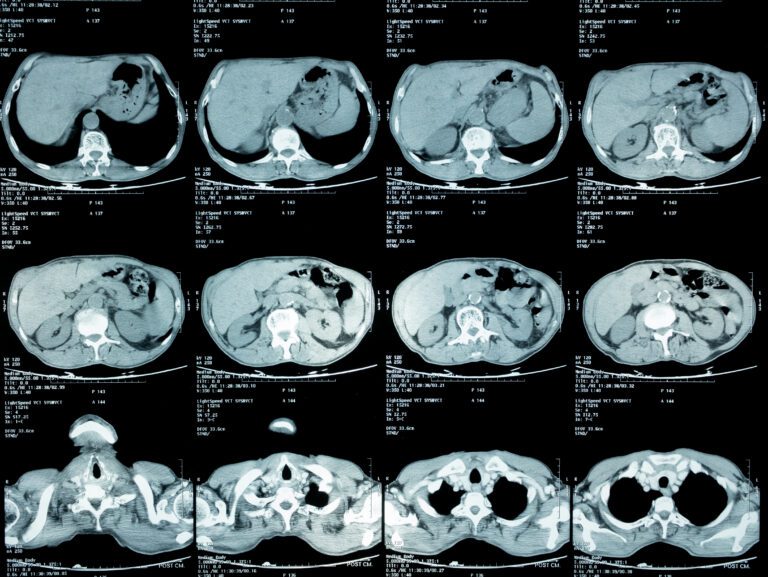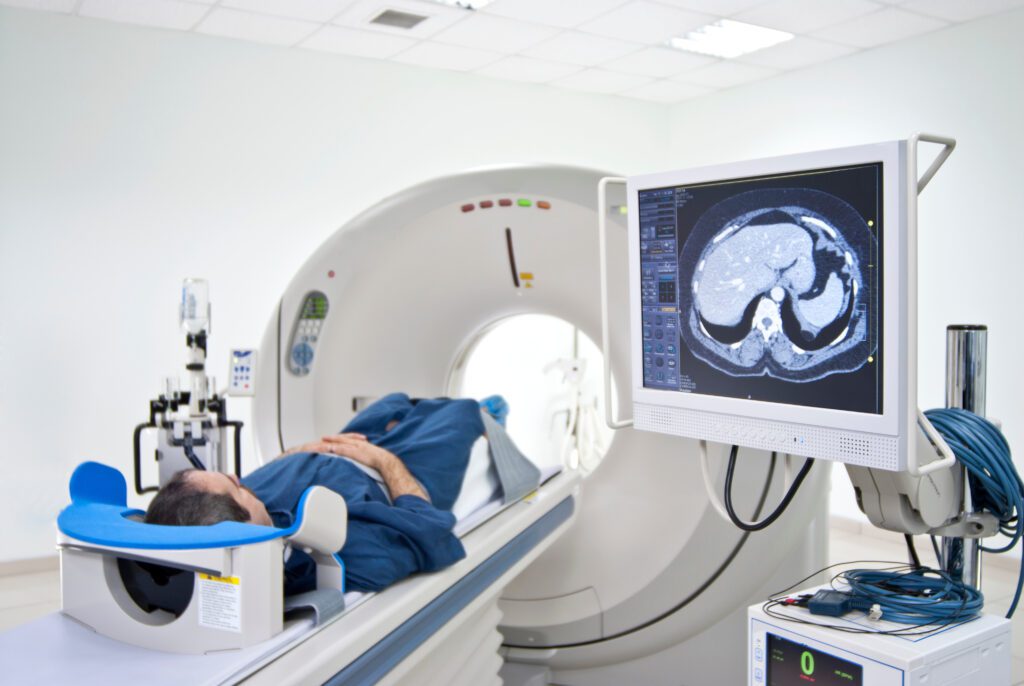When you experience pain or discomfort in the middle part of your body or torso, your healthcare provider may recommend a CT scan of your abdomen and pelvis. A CT scan can be instrumental in diagnosing abdominal or pelvic pain by providing detailed cross-sectional images of internal structures.
CT scans offer highly detailed images of the abdominal and pelvic structures, including organs, blood vessels, and tissues. This level of detail can help identify the source of pain, such as abnormalities, masses, or structural issues with your internal organs.
A CT scan of the abdomen and pelvis is highly reliable in diagnosing a wide range of conditions, due to their ability to provide detailed images of the inside of your body. In particular, CT scans play a crucial role in identifying the source of abdominal pain and discomfort.
Understanding CT scans of the abdomen and pelvis
A CT scan, or computed tomography scan, is a medical imaging technique that combines X-ray technology with computer processing to create detailed cross-sectional images of the body’s internal structures.
It provides a more comprehensive view than traditional X-rays, offering detailed pictures of bones, organs, blood vessels, and tissues. The CT scan process involves the use of a rotating X-ray machine that emits a series of narrow beams through the body from various angles.
CT scans, X-rays, and MRIs are all medical imaging techniques, but they differ in terms of the technology used, the type of information they provide, and the conditions they are best suited to diagnose. While X-rays are quick and effective for certain situations, CT scans and MRIs offer more detailed and comprehensive information, aiding healthcare professionals in making accurate diagnoses and treatment plans.
Why your healthcare provider recommended an abdominal and pelvic CT scan
A CT scan of your abdomen and pelvis will help your provider start answering questions about your pain or discomfort. Your provider recommended a CT scan to get a detailed and accurate look inside your mid-section, so they can better understand the source of your discomfort, and make a treatment plan to support your care.
Some of the most common reasons for having a CT scan of your abdomen and pelvis may include:
- Abdominal pain: If you have persistent or severe abdominal pain without an obvious reason, your provider may order a CT scan to identify the source of discomfort. It can help diagnose conditions such as appendicitis, gallstones, or abdominal infections.
- Unexplained weight loss: If you have rapid and unexplained weight loss, a CT scan can help investigate potential underlying causes, including gastrointestinal issues, tumors, or organ abnormalities.
- Gastrointestinal Issues: Symptoms such as chronic diarrhea, blood in stool, or changes in bowel habits could lead to a CT scan to evaluate the gastrointestinal tract for conditions like inflammatory bowel disease, tumors, or obstructions.
- Kidney or bladder problems: CT scans can provide detailed images of the urinary system, helping to diagnose conditions such as kidney stones, tumors, or urinary tract infections.
- Suspected tumors or masses: A CT scan is a valuable tool for detecting growths or other abnormal masses in the abdomen and pelvis. CT scans can help in determining the location, size, and nature of the mass.
- Infections: In cases of suspected abdominal or pelvic infections, a CT scan can visualize the affected areas, and assist in identifying the source and extent of the infection.
CT scans are versatile and can visualize a wide range of conditions, including tumors, infections, inflammation, kidney stones, gastrointestinal issues, and other conditions. This makes CT scans valuable for diagnosing various causes of abdominal or pelvic pain.
When a more comprehensive evaluation of the abdomen and pelvis is needed, including assessment of both soft tissues and bones, CT scans are your provider’s preferred choice. If the cause of abdominal or pelvic pain is unclear after initial assessments, a medical professional may order a CT scan to obtain a more detailed and conclusive diagnosis.

Getting ready for your CT scan
Preparing for a CT scan of the abdomen and pelvis involves a few key steps to ensure accurate and effective imaging. Your doctor may provide specific dietary instructions, such as fasting for a certain period before the scan. Fasting helps ensure a clear image of the abdominal organs.
Inform your healthcare provider about any medications you are taking, especially if they include metformin or other drugs that may affect kidney function. Adjustments may be necessary. Inform the medical staff about any allergies you have, particularly to iodine or contrast material. In some cases, a contrast dye is used to enhance the visibility of certain structures.
You may be asked to change into a hospital gown and remove any metal objects, including jewelry, belts, and hairpins, as they can interfere with the imaging. If there is a possibility of pregnancy or if you are breastfeeding, inform your healthcare provider. Radiation exposure can be harmful to a developing fetus, and adjustments may be needed.
Drinking water before the scan may be encouraged to help clear the contrast material from your body more effectively. Follow any hydration instructions provided. Arrive at the imaging center a little early to complete any necessary paperwork and allow time for preparations. Your healthcare provider or the imaging center will provide specific instructions based on your individual case.
Be sure to communicate with your healthcare team and imaging professionals, providing them with accurate information about your health, medications, and any concerns you may have. This ensures a smooth and successful CT scan experience. If you have any questions or uncertainties, don’t hesitate to ask your healthcare provider for clarification.
After your CT scan: what comes next?
Once a radiologist has interpreted the CT scan, your healthcare provider will schedule a follow-up appointment to discuss the results with you. Some healthcare facilities may provide results electronically, while others might prefer to discuss findings in person during a follow-up appointment. It’s essential to communicate with your healthcare provider’s office to understand their specific process for result communication and follow-up.
After you receive your CT scan results, you may have a follow-up appointment with your healthcare provider to discuss the findings and determine the next steps. Ask your healthcare provider to explain the findings in a way that you can understand. This includes anything concerning that appears in the images.
In some cases, additional tests or studies may be recommended to gather more information or confirm a diagnosis. Ask your healthcare provider about the necessity and purpose of any further testing. Understand the prognosis associated with the identified condition. This information can help you and your healthcare provider plan for future care and follow-up.
How to schedule your CT appointment with us
Touchstone Medical Imaging offers CT scans in Arkansas, Colorado, Florida, Montana, Oklahoma, and Texas.
Reach out to us at Touchstone, and we’ll help you schedule a mammogram appointment at an imaging center near you, today.
We’re here to help you get the answers you need.
A CT scan uses X-rays and computer technology to create detailed images of internal body structures.
CT scans provide more detailed images than X-rays and are faster than MRIs, making them effective for certain diagnoses.
Preparation may include fasting for a few hours and possibly drinking a contrast liquid, depending on your doctor’s instructions.
Symptoms like severe abdominal pain, unexplained weight loss, or changes in bowel habits often warrant a CT scan for diagnosis.
A CT scan can identify issues like infections, tumors, or organ abnormalities that might be causing pain.
CT scans are often preferred for their speed and precision in emergency situations or when detailed images are required quickly.
CT scans are highly reliable, offering detailed images that help in accurately diagnosing various conditions.
CT scans can detect a range of conditions including tumors, infections, kidney stones, and vascular disorders.
It provides detailed images that help doctors assess the extent of a condition and plan precise surgical or treatment approaches.

